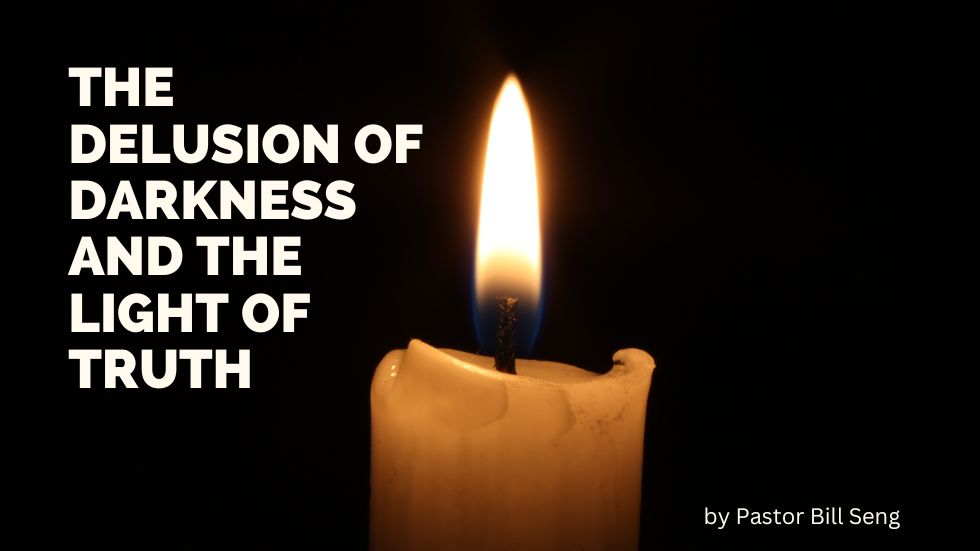As we journey through the season of Lent and approach the sacred days of Easter, it’s fitting to reflect on the events leading up to Jesus’ triumphal entry into Jerusalem and His ultimate sacrifice on the cross. In the third part of the “Remembering Jesus” sermon series, we explore the powerful contrast between those who dwell in spiritual darkness and those who step into the light of Christ’s truth.
The Gospel of John masterfully employs the imagery of light and darkness to depict the divide between those who believe in Jesus and those who reject Him. Those who live in darkness reject the light because it exposes their wicked deeds, clinging to a prideful delusion of self-righteousness. On the other hand, those who step into the light of Christ are humbled, acknowledging their sinfulness and need for a Savior.
The Delusion of Darkness
In our modern age, we see a disturbing trend where people not only fail to hide their sinful actions but proudly flaunt them as though they are virtuous deeds. This is the epitome of the delusion that ensnares those who dwell in darkness. They shape their perception of reality to fit the twisted “truth” they want to believe, blinding themselves to the light of genuine righteousness.
The Pharisees, who conspired against Jesus, exemplified this delusion. When faced with the undeniable miracles and teachings of Christ, instead of acknowledging His divine authority, they hardened their hearts and plotted to extinguish the light. Their fear of losing power and influence drove them to contemplate murdering not only Jesus but also the resurrected Lazarus, a living testament to Christ’s power over death.
The Darkness Loves Death
Those who embrace darkness inevitably embrace death and destruction. The shooter in Nashville, driven by hatred and a distorted sense of identity, targeted innocent children at a Christian school, worshiping death and reveling in the suffering they inflicted. This tragic event serves as a sobering reminder of the depths of depravity that the human heart can sink to when shrouded in spiritual darkness.
In contrast, Jesus, the embodiment of light and life, came to offer salvation and eternal life to all who would believe in Him. The Pharisees, blinded by their delusions, could not comprehend this truth and sought to snuff out the light that exposed their wickedness.
The Triumphal Entry
As Jesus made His triumphal entry into Jerusalem, the people lined the streets with palm branches, recognizing Him as the long-awaited Messiah and King. They sang out, “Hosanna! Blessed is he who comes in the name of the Lord, even the King of Israel!” This joyous celebration stood in stark contrast to the misery and rage of the Pharisees, who feared the loss of their power and the Romans’ intervention.
The Anointing at Bethany
In the midst of this tension, a remarkable event occurred in Bethany. Mary, the sister of Lazarus, anointed Jesus with a precious alabaster jar of pure nard, an act of worship and preparation for His impending death and burial. Judas Iscariot, consumed by greed and theft, objected to this extravagant offering, revealing the darkness that had taken root in his heart.
Jesus’ rebuke of Judas exposed the delusion that had taken hold of the disciple. Judas likely doubted Jesus’ understanding of their financial situation and the need for resources to fuel a supposed military campaign against Rome. His own covetousness and misguided expectations blinded him to the truth of Christ’s mission of sacrificial love.
The Pattern of Darkness
Throughout the events leading up to Jesus’ crucifixion, a pattern emerges. Jesus performs a good deed, and the darkness dwellers, the “bad guys,” seek to rain on the parade, dismissing or diminishing the significance of His actions. Their arrogance and self-righteousness lead them to believe they could have done it better, exposing the delusion that they know better than God Himself.
The Arrogance of Self-Righteousness
This arrogance manifests itself in our tendency to critique the good works of others, saying, “Yeah, what they said or did was correct, BUT if it were me, I would have done it differently.” Such a response stems from a delusional belief that we possess superior wisdom or knowledge than those whom God has appointed to carry out His work.
The Cross: God’s Perfect Plan
Some even question the necessity and cruelty of the cross, suggesting that a loving God should have found a less violent way to save humanity. However, in our sinful state, we deserve the punishment of death and eternal separation from God. The cross was not an act of cruelty but an expression of God’s immense love, as He offered His perfect Son as the ultimate sacrifice to pay the price for our sins.
The Call to Repentance
As we prepare our hearts to celebrate the resurrection of our Lord, we must heed the call to repentance and step out of the darkness and into the light of Christ’s truth. We must shed the delusions of self-righteousness and acknowledge our utter dependence on God’s grace and mercy.
In the words of the sermon, “Our attitudes should be, ‘Jesus came to rescue sinners, of which, I am the worst.'” Only by embracing this humility can we truly experience the transformative power of the Gospel and join the ranks of those who will one day welcome the returning King with joyful cries of “Hosanna! Blessed is He who comes in the Name of the Lord!”
As we journey through the remainder of Lent and into the celebration of Easter, may we fix our gaze on the light of Christ, rejecting the delusions of darkness and embracing the truth that sets us free. For in Him, we find salvation, resurrection, and the promise of eternal life.

